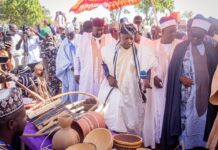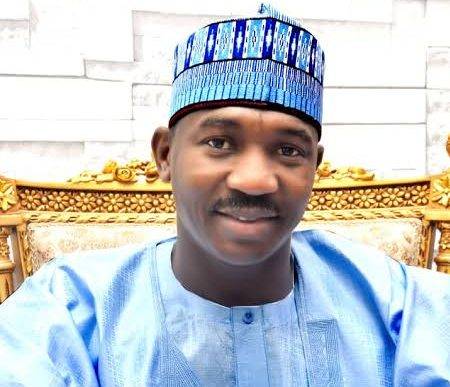BY DAMIAN OKOROAFOR
Amid simmering outrage over yet another rude revelation of a feud between important government functionaries with grave implications on national security, it is now a sad fact that the security challenges spawned by the Boko Haram insurgency have infiltrated the nation’s security infrastructure like a cancer attacking a vital organ of the human body. In the latest manifestation, the apex coordinating unit of the security agencies, the Office of the National Security Adviser (ONSA) raised the alarm after realizing that the Chief of Staff in The Presidency had been usurping its role by meeting with service and security chiefs in its absence.
The circumstances of this disturbing revelation and the loud silence that followed it combine to indicate that all is not well with the official relationships between these two important organs of the Presidency. The most rattling dimension of the matter is the NSA’s contention that the meetings summoned by the Chief of Staff were not only ill-informed professionally but also used to counter existing Presidential directives on security matters. Altogether, this episode of conflict in the management of the nation’s security constitutes a major security challenge even without the worsening insecurity unleashed by insurgency, banditry and kidnapping, pushing the country towards dire emergency situation.
The growing public concern about the endless deadly resurgence of Boko Haram activities in the North East has put the military command on the defensive in responding to loss of public confidence in the operational dynamics on the battle front. It is now reasonable to give serious thought to the possibility of the external drivers of the BH insurgency somehow infiltrating the internal management of national security as part of their ultimate agenda for devastating our territorial integrity, disuniting the polity along ethnic and religious lines and destabilizing the government.
Under widespread and worsening insecurity, it would be a strategic offensive for the enemy to target the national security structure with sabotage by sowing seeds of discord in the rank and file’s espirit de corps and fragmenting cohesion of the commands. A brief recall of the emergence of inter-agency conflict and rivalry in the recent past will be helpful in spotlighting the gradual but calculated process of attacking the operational synergy and command cohesion of some of the security agencies and disrupting the political stability of the government.
In the background to the tacit crippling of the nation’s security apparatus at a critical time of insurgency increasing outbreaks of serious crime eroding the internal stability was the unwarranted and unprecedented personalization of command positions leading to personalization of institutional relationships. Public affairs analyst Chris Ngwodo captured the implication thus : “when an institution is rubbished and everything becomes a fair game because of personal clashes, then the system suffers.”
Interestingly, this scenario first emerged in the rivalries between the Office of the National Security Adviser, Major General(rtd) Babagana Monguno and the then Director-General of the SSS, Lawal Daura, who frequently flaunted supposed extraordinary Presidential backing for some of his sensational unilateral actions such as disregard of the NSA’s supervisory function and deploying SSS operatives on arbitrary missions.
Preventing an EFCC team from arresting former SSS DG Ekpenyong at his residences, leading to a tense standoff was followed by another incident where he shielded ex-Director General of the National Intelligence Agency (NIA), Ayodele Oke from arrest over the $43.45 million recovered at Osborne Towers in Ikoyi, Lagos by EFCC with a squad of armed DSS operatives. In an earlier inexplicable move, the former DG SSS countered Presidential recommendation for confirmation of Ibrahim Magu as Chairman EFCC by the Senate with a damning letter detailing alleged reasons for disqualification.
Not even the Nigeria Customs Service escaped Lawal Daura’s bulldozing tactics targeting security agencies aimed at disrupting inter-agency cooperation. He sent a letter to President Buhari accusing the Nigerian Customs Service (NCS) of introducing $25,000 as new Temporary Import Permit (TIP) levy on each vessel that berths to discharge petroleum products in Nigeria, which he said was illegal and could increase the cost of petrol. Hamid Ali, Customs boss told the President that “proper investigation should always be carried out on complaints such as this which casts serious doubt on the integrity of services and organisations with a view to ascertaining the truth” adding “ the DGSS should therefore be advised to approach issues professionally and not allow sentiments or personal vendetta to drive his actions.”
The deployment of hooded SSS operatives to barricade the entrance to the National Assembly was regarded as the last straw that saw to the summary sacking of Lawal Daura by VP Osinbajo. According to the then IGP, Ibrahim Idris who handled the investigations, from statements he made it is possible that he acted the script of “highly-placed politicians” when he “illegally used his position as the then director general of Department of State Security Service, conspired with his officers and men who wore hoods and masks, invaded the national assembly complex thereby preventing the peaceful members and staff of the national assembly from gaining access to the complex, without any element of crime committed or an invitation by the leadership of the national assembly.” He added that the DSS personnel “acted like mercenaries hired to carry out execution”!
These represent some of the alarming instances of the instigation of confrontational relationship among security and related agencies of government the impact of which could only have been disruptive to the espirit de corps and command cohesion critical for operational efficiency in checking insurgency and other serious criminal activities threatening national security and stability of government. It is worrisome that the NSA is still complaining of continued disregard for his office long after the unceremonious departure of Lawal Daura but the greatest shock is the revelation that the high command of the military was now off his radar.
The dysfunctional freezing of strategy and command appointments in spite of obvious tactical failure and diminishing morale among troops not to mention public agitation and legislative directive for immediate change, provides linkage to the possibility of external sabotage of expected patriotic management of Nigeria’s defense and security infrastructure and operations.
Charles Omole, a security analyst, states that “the latest trend amongst countries across the world is bringing together all their security agencies under one command for a coherent and efficient national security, but Nigeria still allows silos amongst security agencies that prevent them from cooperating with one another.” Ominous !
DAMIAN OKOROAFOR, a security analyst, wrote from Port Harcourt



